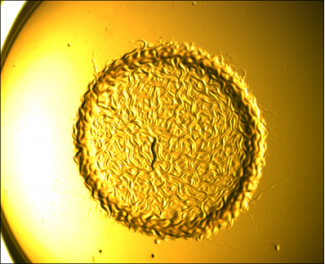Reproductive Biology, Cell-Cell Interactions
Fertilization is a biological process that has important medical, economic and social implications. Our primary research interest is the mechanisms of sperm-egg interactions. This includes understanding the molecular events that mediate gamete recognition, adhesion, signaling and fusion. The genetic and molecular dissection of these events will also provide insights relevant to other important cell-cell interactions during the life and development of multicellular organisms.
We are helping to pioneer the use of the nematode worm Caenorhabditis elegans for addressing the mechanisms of sperm-egg interactions. The powerful tools of classical and molecular genetics developed for the worm are not available or are very difficult to utilize in the other organisms traditionally used for studying fertilization. The amoeboid sperm of C. elegans, despite lacking an acrosome and flagellum, carry out the same basic functions common to all spermatozoa.
